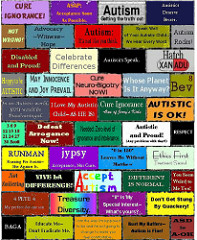Reading the morning news is dreadful for the happy digestion of my breakfast. Everywhere I look there are devils and angels, pantheons and freak shows, all in the name of disability.
It’s hardly not a new trend. But this millennia-old attitude does a terrible disservice to disabled people everywhere to be cast as either devils or angels. It is dehumanizing, and removes us from our humanity, and thus our basic human rights.
Being disabled is seen as a condition so horrid that no one could imagine living a happy, (otherwise) healthy, productive life. Not despite the disability, and not especially with the disability or even because of the disability. Being disabled is a fate worse than death. It turns a person into a “toxic train wreck” or it’s “worse than cancer” (because a person with autism, unlike a person with cancer, has a normal lifespan). So horribly unimaginable is being disabled that euthanasia is often deemed acceptable and even an appropriate “solution” to disability.
It has been not very long since people with various disabilities (and other differences) were routinely institutionalized (unfit for being in human society), and often sterilized. A person could be subjected to forcible surgery for such eugenic reasons as being blind, deaf, epileptic, poor, of a native (aboriginal) race, of mixed races, alcoholic, having a physical deformity, cognitive disability or perceived mental illness. Had I been institutionalized as a teenager, my children might not exist.
Being disabled is also seen as a condition where a family is divinely blessed to have been given such a special child who is looked after by angels. I’m not slamming those parents who feel that their children are blessings, but rather saying that all children are such – having a disabled child in the family does not earn a person extra cosmic “brownie points”.
The angelic disabled person is not-quite-human, a tragic but romanticized virgin on a pedestal of virtue. Certainly not an everyday sexual adult; a female person should never do anything as inconvenient as menstruate. Like 19th-century women, the disabled are sometimes cast as cherubic, above the base animal instincts of men, and held in divine favor. In medieval times, the town’s fools were excepted from normal citizenship, either as unclean or sometimes soothsayers, if given to (epileptic or other) fits.
In current news there is the case of the “Ashley Treatment” where a young disabled girl’s parents have elected to have her undergo several surgical treatments plus œstrogen therapy to keep their “pillow angel” a small, manageable size and to remove her breast buds and uterus to prevent her natural sexual development. Removing breast-buds to prevent cancer is a specious argument. I don’t know if the history of cancer is from the maternal and/or paternal side(s) of the family, but it’s pretty telling that we don’t hear of mom and/or dad also having mastectomies to prevent cancer. After all, cancer is more commonly found in older people. Likewise it’s another specious argument that making her infertile will prevent the potential for sexual abuse from caregivers – children are just as easily targets of molestation (it simply makes any abuse more difficult to discover because she won’t unexpectedly come up pregnant). Were she male, would the child have similar surgeries?
At that rate, one could simply hobble a child so they never ran away. Or one could mute a child so they wouldn’t scream loudly when upset. Or one could remove all of a child’s teeth so they couldn’t bite anyone when scared – oh wait, people have already done that …
I have to sympathiese with her parents; caring for someone on a daily basis is difficult. But trying to prevent sexual abuse or care difficulties by surgically removing body parts is working at the wrong end of a major social problem. It’s completely backwards! The problem is not that disabled people exist, but rather that there are not suitable social support networks for disabled people and their family members.
Many handicaps are socially created — it’s not the person who has the problem, it’s the way society is set up.
No longer is the disabled person a sick lurid spectacle to be hidden away. They are once again on parade, the freak show turned into infobites. An insidious side effect of freakifying the disabled as devils and angels is that it not only creates the disabled as Other, but it also does a great disservice to those who view themselves as nondisabled: it makes a person glad to be normal, and content to be average. It perpetuates the divisions and reinforces the dualities. With such positions, we can never create inclusivity.
What could be worse than being cast as devil or angel? Being totally discounted as a non-person. Being neglected and dying a slow, painful death like Sarah Crider or Tiffany Pinckney.
The human race has a lot to answer for.








Catapulting to Conclusions « Andrea’s Buzzing About: said,
3 May 2008 at 18:24
[…] previously discussed how PWD are lumped into false dichotomies of devils or angels; the angelic disabled person is not-quite-human, a tragic but romanticized virgin on a pedestal of […]
Shelbie said,
17 January 2008 at 2:27
A very intresting piece, i have a handy capt sister so i can feel a lot of the familys pain, i have no idiea what would do if any of those things had happend to me. Maybe with examples like this people will opean their eyes for a growing epidemic, neglectment.
M, F, N/A « Andrea’s Buzzing About: said,
10 October 2007 at 4:59
[…] there’s the whole dreadful déjà vu of the Ashley X story revisited with the Katie Thorpe news. The parents of the 15-year old English girl with […]
Dear Inspired, « Andrea’s Buzzing About: said,
28 July 2007 at 0:23
[…] talked with. That’s objectifying. It makes me something exotic and not-quite-human, a kind of angel that will be re-cast as a kind of devil at the first sign of […]
Mike Stanton said,
21 January 2007 at 1:42
Well said, indeed. You might be interested in reading this.
http://ieet.org/index.php/IEET/more/corwin20070107/
qw88nb88 said,
13 January 2007 at 2:56
Thank you. This is a very difficult subject for many people. I feel conflicted, too. I agree with the problems, but not the solutions. Unfortunately, saying that the “Ashley Treatment” was the only workable solution is engaging in a false dilemma.
Joseph said,
12 January 2007 at 23:23
Indeed. Well said.